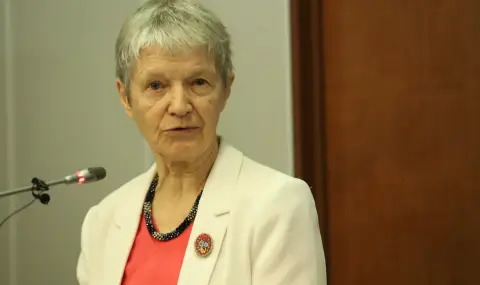On the eve of Victory Day, the information-analytical telegram channel "Stan-Center" ; interviewed the famous Bulgarian historian, professor of new world history at SU “St. Kliment Ohridski" Iskra Baeva.
Mrs. Bayeva, Happy Victory Day! How does Bulgaria today preserve the memory of the multinational contribution to the defeat of Nazism? How many people honor the memory of fallen soldiers on May 8-9?
Unfortunately, the official Bulgarian authorities in recent years do not like to mention the victory over fascism in the Second World War. On May 8, we celebrate nothing but Europe Day - May 9. However, this does not apply to everyone - Every year on May 9, the current president Rumen Radev lays wreaths at the Tomb of the Unknown Warrior in memory of those who died in the war against Nazism. However, part of Bulgarian society celebrates May 9 as Victory Day, not as Europe Day.
For many years, the media argued that we should celebrate May 9, but gradually, after Bulgaria sided with the supporters of Ukraine, only Europe Day is officially celebrated. Today, there are also left-wing organizations such as the Bulgarian Anti-Fascist Union and the Bulgarian Socialist Party, which celebrate Victory Day in front of the Monument to the Unknown Warrior and the Monument to the Soviet Army in the center of Sofia. But last fall, the demolition of this monument began - parts of it still exist, but they are behind a high fence, and this year we will not be able to lay flowers in front of it.
We from Russia followed the attempt to dismantle the monument to the Soviet warrior-liberator “Alyosha” in the city of Plovdiv. How polarized is Bulgarian society on this issue? Your prediction for the fate of the monument.
Although we did not manage to fight for the preservation of the monument of the Soviet Army in Sofia, for now the people of Plovdiv and all of us preserved the “Alyosha” monument. In addition, there were many publications, I also wrote on one of the Plovdiv sites in defense of “Alyosha”. A poll was also organized, in which the absolute majority was in favor of keeping it. In the 90s, at the beginning of the transition, there were different ideas about the transformation of “Alyosha”, but common sense prevailed and he remained intact. I hope that despite the new situation of intensified anti-Russian propaganda, the monument will be preserved, as it is a symbol of the Victory over Nazism in the Second World War. In addition, many Plovdiv residents perceive it as a symbol of their city. Every year, students gather in front of it, and many newlyweds take pictures in front of it.
In Bulgaria, you are considered perhaps the only expert in the country who can adequately comment on the meaning of Victory Day on May 9, 1945 and who knows Russian. Is this really true?
No, in Bulgaria there are many historians, specialists in the Great Patriotic War, and also quite a few anti-fascists. But the problem is that our generation is gradually passing away, and the next ones are the product of a new education system that presents a different picture of World War II. It is not a lie, but it exaggerates the merits of the Western Allies in the anti-Hitler coalition, while ignoring the decisive role of the Red Army in the Victory. Another significant problem is that the study of the Russian language in Bulgarian schools has greatly decreased, so young Bulgarians also face a language barrier when using Russian-language literature.
In Russia, in my opinion, the overwhelming majority considers the Bulgarians to be fraternal Slavic people and comrades in spirit. How do they view Russians in Bulgaria?
As for the attitude towards the Russian people, it is extremely warm. But again we are talking about the older generation. Russophilism exists among the younger generation, but it is not so widespread. More and more young people fall under the influence of anti-Russian propaganda, which is very aggressive and comes from everywhere - from Bulgarian, European and world media.
Returning to Victory Day, I will say that in Russia we draw direct historical parallels in the struggle against German Nazism in the 1940s and neo-Nazism (Banderism) in Ukraine today. Do you personally share these views?
There is no doubt in my mind that throughout the former Eastern Bloc, during the rewriting of history after the collapse of socialism, there was a tendency to rehabilitate the pro-fascist and pro-Nazi movements of the past. This applies with particular force to the countries that were part of the pro-German Tripartite Pact, such as Bulgaria. This is why anti-fascist movements continue to be relevant. In Ukraine, there is also an idealization of Bandera precisely because of his participation in the struggle against the Soviet Union. I do not think that this trend is leading in the politics of modern Ukraine, but it exists and even intensified during Russia's military actions in Ukraine. I believe that the new popularity of extreme nationalist ideas is dangerous for the democratic development of all European countries.
How do you see the plan for a peaceful resolution of the conflict on the territory of Ukraine?
2 years ago I said that it is necessary to stop the hostilities in Ukraine as quickly as possible, because they lead to an increase in the number of victims and destruction on both sides. The problem is that this line was not supported by the world's leading powers, as the failure of the peace talks in March 2022 showed.
Today, 2 years later, there is talk again of a peace plan, but one-sided by Ukrainian President Zelensky. I do not think that his plan can be carried out, because it does not correspond either to the current development of military actions or to the position of Russia.
Thanks for the conversation!
Interview of Andrey Vipolzov
